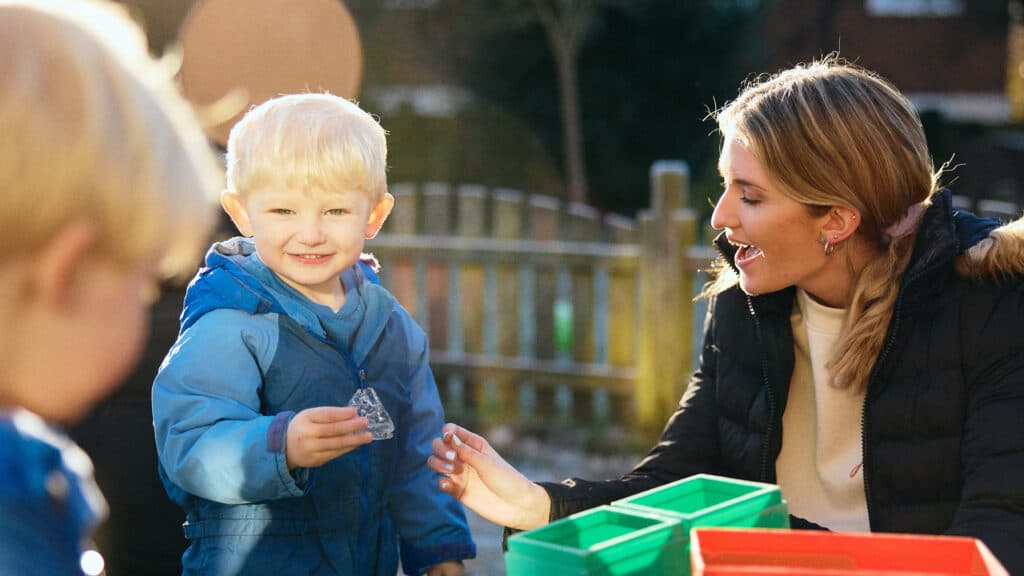10th
in the UK for student satisfaction
Complete University Guide 2023
95%
positivity that the course has developed your knowledge for the future
National Student Survey 2024
Top 10
for learning opportunities
National Student Survey 2024
Join us at one of our Open Days!
Saturday 11 October
Sunday 26 October
Saturday 22 November
Saturday 11 October
Sunday 26 October
Saturday 22 November
Our next Open Day is in:
Overview
Conclude your journey towards a full BA degree in Early Childhood Studies
The BA (Hons) Early Childhood Studies (level 6 top up) is a one-year full-time or two-year part-time course.
National Student Survey 2023
Overall average positivity
Organisation and management
Learning resources
This course provides a progression for those who wish to ‘top up’ their Early Years Foundation Degree or equivalent foundation qualification to a full BA Honours degree.
It is delivered one day a week making sure it’s flexible to accommodate your other commitments.
The range of modules enables you to explore key aspects of childhood from the psychological and sociological, to the global and cultural, to the economic and educational.
You will develop problem-solving, critical analysis and independent thinking skills as well as gaining knowledge of areas which are of particular interest.
On this course you will
- Investigate, understand and analyse the fast-changing landscape of working with young children.
- Gain your full BA degree in Early Childhood Studies.
- Provide a firm foundation for a career within educational settings.
The Course
Explore key psychological and sociological aspects of childhood
You will explore fundamental aspects of childhood development and the factors that affect it. Our range of modules allow you to examine the effects of global economic cultural factors on child development.
You will develop problem-solving, critical analysis and independent thinking skills as well as gaining knowledge of areas which are of particular interest.
Graduate Practitioner Competencies
If you already have a ‘full and relevant’ Level 3 qualification and Level 2 qualifications in Maths and English, you may be eligible to apply for Graduate Practitioner Competencies. These provide an opportunity to strengthen and enhance practice, skills and knowledge.
For further information please contact Sandra Lyndon (s.lyndon@chi.ac.uk).
If ‘full and relevant’ status (Level 3) is not already held, there is an opportunity to gain this via our Foundation Degree in Early Years.
Modules
Children, Stories and the Media
This module uses children’s stories and the media to explore current and past constructs of childhood. Specific examples of these media are used to consider the wider social, cultural and educational issues that surround their production and consumption.
In this module, you will critically examine studies of how children engage with a range of different media that is produced for children.
This includes:
- books (both fiction and non-fiction)
- television
- film
- the ‘new media’ that is available for children, including other interactive media such as computer games.
You will also consider the ways in which those who study childhood have sought to understand this engagement. The module will take a broad approach, drawing on theories from a range of social science and cultural disciplines.
Crime and Childhood
This module explores children and criminality from various points of view, from offending to court procedures, from explanations of children’s crime to protection of victims, and allows you to draw conclusions about the special status of children and the legal system.
You will examine the ‘social construction of childhood’ both historically and internationally in regard to how children are treated in the criminal justice system.
Case studies will be used to illustrate how criminal law and childhood is given particular significance, including use of media coverage.
Issues around children and crime are of contemporary relevance, and this module will provide insights into the many avenues of childcare practice that are connected to the criminal justice system.
Graduate Practitioner Placement
This practical placement module builds on theory from taught modules in the programme and placements at both Levels 4 and 5. It gives you opportunities in relevant settings to achieve the Early Childhood Graduate Practitioner Competences. You will complete 25 days in a placement setting and workshop sessions in the university.
Independent Project
The independent project is designed to engage you in a longer-term and analytical piece of research on a topic relevant to Early Childhood Studies. The module includes a focus on the research process. This includes guidance on research design, writing a literature review, application of methodological approach and method(s) used, ethical issues, data collection and analysis.
Leading Professional Practice
This module aims to introduce you to the key factors that affect strategies for leading and managing in Early Years provision. You will develop knowledge and understanding of how to improve practice through working alongside staff, children, families and other professionals.
Adventure Education
This module introduces you to the innovative and adventurous environments in which children can develop, learn and play such as Forest Schools and Beach School.
You will examine the theoretical, psychological, physical and social processes and benefits for children and Early Years professionals/teachers that come with activities away from conventional environments.
The module considers the history and theory that has shaped ‘adventure’ environments in the past, and continue to affect them in the present.
The Digital Child
The module introduces you to the digital experiences of childhood, and the effects of technology on children in a fast-changing world, as you assess the benefits and drawbacks from social, emotional and behavioural perspectives.
The module examines access to the online world, and policy and parental attempts to control children’s digital consumption.
Therapeutic Play
This module aims to explore and critically analyse the centrality of play in enabling children to make sense of the world around them and their place within that world, especially when experiencing trauma.
Teaching and Assessment
Feel the support of our staff as you gain confidence in your abilities
Teaching
You will learn from expert practitioners and accomplished academics with a wide range of experience within the field of Early Childhood Studies.
We bring new research together with established theory into the classroom through a mix of direct teaching, seminars and activity-based learning.
Within your learning sessions, you will be challenged to go further and be encouraged to be proactive, responsive and responsible for your own learning and ideas outside of the classroom.
Our focus on group discussion and the consideration of the thoughts of others allow you to develop your own ideas.
Assessment
It is important that our assessments are designed to meet the various learning needs of students.
We offer a variety of assessment methods that include presentations, assignments, exams, academic posters and placement portfolios.
We also encourage our students to publish their work. Past students have had articles accepted in sector publications such as Early Years Educator.
Experience
Discover facilities that help support your learning experience
Close community
Our commitment to a friendly and close-knit student community contributes to a high degree of success for our graduates.
Learning Resource Centre
The Learning Resource Centre (LRC) contains the library, a café, IT/teaching rooms and the Support and Information Zone (SIZ).
Library
Our campus library holds more than 200,000 books and over 500,000 eBooks.
Expert staff
Learn from expert and experienced teaching staff who are here to support your needs.
Subject specific librarians
If you have difficulty finding material for an essay, seminar or project, subject librarians will be happy to provide assistance.
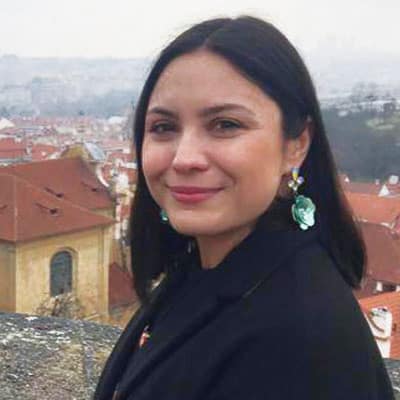
Chloe
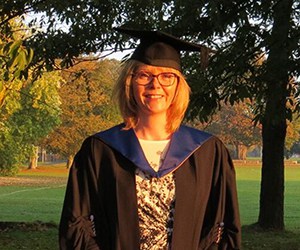
Lisa

Jinny
Family Festival 2024
The Childhood and Social Work department organised the inaugural Family Festival in response to student feedback. There were many free activities for students and their families to participate in and the day was a huge success. There is something special about the way we listen to our students and then turn this into practical action and support.
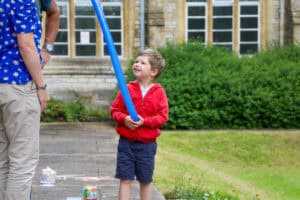
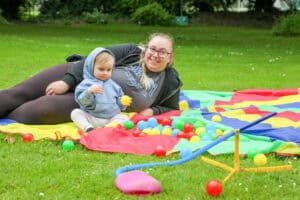
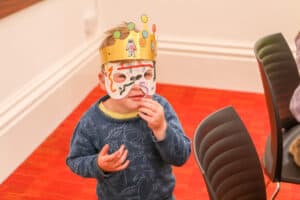
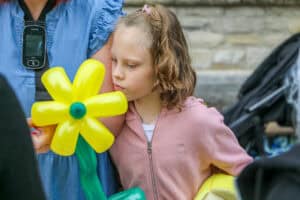
Careers
Develop your career opportunities within early years professions
With this degree, you can pursue a career as an Early Years Practitioner.
You’ll foster and develop the abilities, social skills and understanding of children aged three to five, focusing on optimum child development and preparation for a successful transition to primary school education.
Possible career paths include:
- Early years management
- Teaching
- Health and social care
- Policy-making
- Nursery management
- Hospital support
- Outreach worker with family centres
- Community development.
University of Chichester alumni who have completed a full undergraduate degree at the University will receive a 15% discount on their postgraduate fees.
Course Costs
Course Fees 2025/26
UK fee
International fee
EU/EEA Fee Reduction Scholarship
EU/EEA students automatically pay the equivalent of UK fees via the EU/EEA Fee Reduction Scholarship.
For further details about fees, please see our Tuition Fees page.
For further details about international scholarships, please see our Scholarships page.
To find out about any additional costs on this course, please see our Additional Costs page.
Course specific costs
You will be required to have a satisfactory enhanced Disclosure Barring Service (DBS) check costing £40 which needs to be paid for before the start of the course.
Entry Requirements
Credits
Early Years
Professional experience of working and/or volunteering in an early years setting, such as nursery, day care, childminding, school (Year R or Key Stage 1), children’s centre or other.
Contextual offers
We believe everyone deserves an equal opportunity to pursue higher education, regardless of their background.
When we receive your application we consider your personal circumstances and the factors surrounding your achievements to see if you are eligible for a contextual offer. This is an offer with a reduced entry tariff – typically the equivalent of 16 fewer UCAS points (two A-level grades).
Find out more about our contextual offers.
